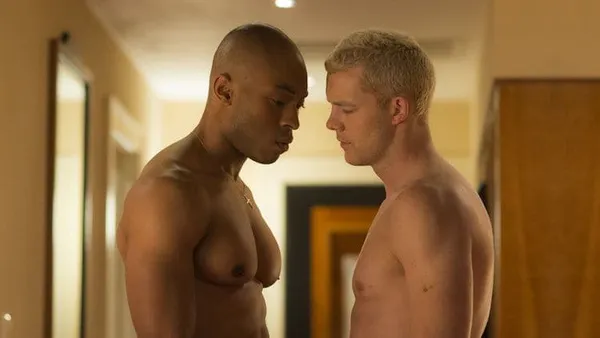Eye For Film >> Movies >> The Pass (2016) Film Review
The Pass
Reviewed by: Owen Van Spall

Director Ben A William's The Pass, adapted from John Donnelly’s 2014 Royal Court play, bears more than a little similarity to Barry Jenkins’ Moonlight. Like Jenkins’ film, The Pass explores the high emotional toll of years spent in denial and in hiding, as well as probing the complex interplay between masculinity, sexuality and socio-economic pressures when fame or notoriety is an issue. It largely does a good job, though it is small in scale and frequently betrays its stage origins. It is very well acted, with an explosively complex lead performance from Russell Tovey and an equally expressive supporting turn from Arinzé Kene.
Tovey plays Jason, a young soccer player amped up and unable to sleep, wandering - in his briefs - his plush Bulgarian hotel room on the night before an important match. He’s not alone though; the club have put him up with Ade (Kene), another aspiring and very ripped Premier League footballer who, it is revealed, has been close friends with Jason since childhood. The banter between them is fast-paced and boisterous, with a hint of an edge to it; clearly they are anxious about the coming 90 minutes - it literally could define their future careers given there is only one spot freeing up in the front-rank team.
Despite all the playful insults and chat about girls, fame and the beautiful game, it becomes possible to sense a simmering tension in the air. Maybe it’s the looks Jason gives Ade or the way he seems to over-egg his laddish behaviour as if deflecting or compensating. Maybe it’s the frequent, lingering physical contact. Eventually, things reach breaking point and one of the men leans in to kiss the other. This throws up all sorts of interesting and provocative questions - not just about what is going to happen to these two men currently striving in a sport that prizes heteronormativity and extreme masculinity (which the film teases is a front for a lot of hypocrisy and denial under the image of those rippling torsos), but also about the nature of their relationship. When did the line between friend and lover get truly crossed? Is this really the first time a move has been made? But above all, we are left wondering, what now? And what of the fact that competition is a factor in their relationship, as well as desire?
As with Moonlight, we then are jumped forward to two distinct future time periods, without initially seeing the immediate fallout from that kiss in the hotel room. Still, five years later, there has been clearly devastating emotional consequences for Jason, though it is unlikely that kiss alone is the sole trigger. A frustrated attempt to hire club dancer Lyndsey (Lisa McGrillis) to film having sex with him - the intention being to deliberately leak it to the press to quash rumours of his sexuality - reveals the depths of despair and denial he has sunk to. Lyndsey figures out what is going on pretty quickly, to which Jason offers only seething certainty that he isn’t gay, because he cannot afford to be. Football contracts, hordes of young fans, merchandise arrangements: Jason has created an algorithm in his head - not without justification - that all this falls if his sexuality is so much as acknowledged, even to himself. But it isn’t just cold-hearted economic considerations at play here, Jason is, given his own mindset, a prisoner of a terrible dilemma. Football is his dream, the only thing he has ever wanted to do or been good at, yet his own desires put all that at risk.
Jason is at war with his own body and mind, and Tovey, both in this section and the next five-year jump, effectively transmits a kind of brutal emotional weathering and pent up whirlwind of feelings, which he keeps hidden under a shield of bluster and macho banter. By the time Ade reunites with Jason, in another hotel room in another country, Jason is a pinball of conflicting emotions muddled by drugs and alcohol (the film refreshingly avoids distracting age makeup, letting the performances bring the shades of time). Ade himself has reached an interesting accommodation with his sexuality that Jason has not, and may never, and the line between Jason being genuinely manipulative or finally genuine is unclear. Though this last section perhaps becomes a tad too melodramatic, with the introduction of a third character into what has been until then a two-person chamber piece feeling a bit unnecessary, the two leads bring things to a heartbreaking, mercilessly ambiguous conclusion.
Reviewed on: 13 Oct 2016
















